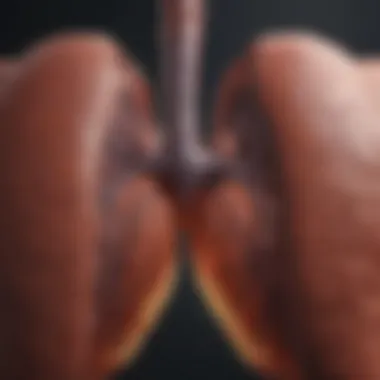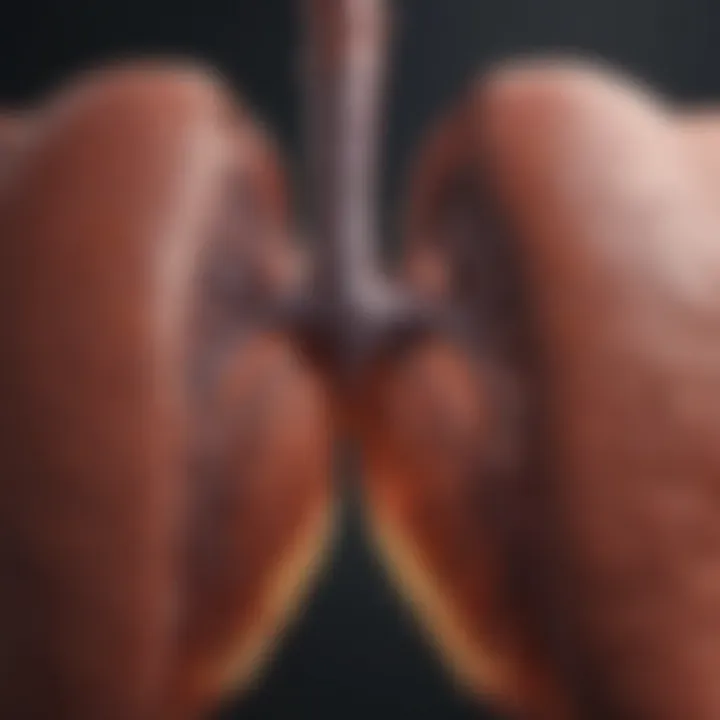Liver Protection from Alcohol: Understanding Risks and Strategies


Intro
In the realm of health, the liver often takes center stage when discussing the impacts of alcohol consumption. This vital organ is essential for detoxifying substances and regulating metabolic processes, making its health crucial for overall well-being. Yet, with the rising social acceptance of drinking, many individuals find themselves in precarious territory, where enjoyment can quickly tip into harm. Thus, understanding the risks associated with alcohol and the strategies to protect liver function becomes essential for anyone with a penchant for a drink.
Alcohol, while often a source of social bonding, holds potential dangers that are too easily overlooked. The liver, when repeatedly tasked with processing alcohol, can become overworked, leading to conditions such as fatty liver, hepatitis, and even cirrhosis. It's not just about how much one drinks; how often and the type of alcohol consumed play significant roles as well.
Being informed is an important first step. Identifying the signs of liver distress, asking the right questions regarding lifestyle choices, and implementing protective measures can significantly alter one’s health trajectory. This article aims to peel back the layers on liver health, examining its delicate relationship with alcohol and providing a slew of strategies for safeguarding this essential organ. In doing so, it hopes to serve as a guide not just for individuals, but for healthcare professionals aiming to understand the intricate dance between alcohol consumption and liver functionality.
Strategies explored in the sections to come will include dietary recommendations, the importance of moderation, and emerging therapies designed to counteract alcohol's damaging effects.
"The liver is the body's version of a recycling plant, taking in waste and converting it into usable energy, crucial for a balanced life."
In the following sections, we’ll explore the methodology of examining this relationship, the findings that emerge from scientific inquiry, and a comprehensive discussion on the implications of this research for both individuals and professionals. Let's delve into the science of liver protection and uncover the paths to a healthier future.
Foreword to Liver Health
The topic of liver health is paramount in the discussion of overall well-being, particularly when you consider the effects of substances like alcohol. The liver is not just a simple organ; it’s an essential player in the complex machinery of the human body. This article aims to shed light on why liver health is significant, especially in the context of alcohol consumption, emphasizing various strategies one can take to protect this vital organ.
Importance of the Liver
The liver stands as the body's workhorse, fending off toxins, managing nutrients, and producing essential proteins. Its importance cannot be overstated. When you consume alcohol, it becomes the liver's job to process and eliminate it. This function is crucial because it prevents the alcohol from accumulating in the body, which could lead to severe health repercussions. If the liver falters, it can open the floodgates to a slew of health issues, ranging from mild dysfunction to life-threatening conditions.
Interestingly, the liver has a remarkable ability to regenerate itself, but this doesn’t mean it should be taken for granted. For individuals who indulge in heavy drinking, the risk of liver damage escalates quickly. Understanding what the liver does and how it operates is key to appreciating why it's so essential to protect it.
Functions of the Liver
The liver performs a delightful array of functions that align with its role as a central hub in the body’s metabolic process:
- Detoxification: It processes and filters out toxins that you might ingest, including alcohol. This helps to maintain a clean internal environment.
- Metabolism: The liver assists in the breakdown of carbohydrates, fats, and proteins. This function stores energy and regulates blood sugar levels.
- Bile Production: Bile is essential for digestion, especially in breaking down fats. The liver produces this fluid, which is stored in the gallbladder.
- Synthesis of Proteins: Numerous vital proteins, including clotting factors and albumin, are synthesized in the liver, helping in blood coagulation and fluid balance.
In essence, the liver’s multifaceted role emphasizes the crucial need for its protection, particularly for those who consume alcohol. Each function emphasizes the miracle of biology and how the body works to maintain balance. Without the liver, the orchestra of metabolic processes falls silent, leading to chaos in health and function.
Understanding Alcohol and Its Effects
The topic of alcohol's impact on liver health is not only critical for understanding personal health but also serves as an essential piece in the wider puzzle of public health. The liver, being the body's primary detoxifying organ, bears the brunt of alcohol consumption, and comprehending how alcohol interacts biochemically and physiologically with this vital organ is paramount. This section elucidates the biochemical processes involved in alcohol metabolism, the immediate repercussions on the liver following consumption, and the potential long-term consequences that can arise from excessive drinking. Each element discussed here plays a pivotal role in developing strategies for liver protection and ultimately improving public awareness.
Biochemistry of Alcohol Metabolism
When alcohol enters the body, it undergoes a complex series of chemical changes. The liver metabolizes alcohol principally through the enzyme alcohol dehydrogenase (ADH). This enzyme transforms ethanol—alcohol’s active form—into acetaldehyde, a toxic compound that is further broken down by another enzyme known as aldehyde dehydrogenase (ALDH).
- Initial Breakdown: The conversion of ethanol to acetaldehyde occurs quite rapidly. Acetaldehyde is known to cause damage to liver cells, and excessive amounts can result in cell death and inflammation.
- Secondary Conversion: The subsequent transformation of acetaldehyde into acetate is crucial, as acetate is less harmful and can be utilized by other cells in the body for energy. However, when the liver is overloaded with alcohol, this process cannot keep pace, leading to toxic build-up.
- Role of Cytochrome P450: In cases of high alcohol consumption, another pathway via the cytochrome P450 system also comes into play. This system, although a secondary process, becomes increasingly significant with chronic drinking. It produces even more reactive oxygen species, which can exacerbate damage to liver tissues.
Understanding these metabolic pathways illustrates why moderation in alcohol consumption is paramount; excessive intake can overwhelm these systems, leading to severe liver damage.
Short-term Effects of Alcohol on the Liver
The immediate effects of binge drinking or heavy alcohol consumption showcase how the liver responds to sudden increases in alcohol concentration. These can manifest in various forms:
- Increased Liver Enzyme Levels: Following heavy drinking, levels of liver enzymes like AST (aspartate aminotransferase) and ALT (alanine aminotransferase) can spike, indicating liver distress and cellular damage.
- Inflammation: Alcohol can induce inflammation in the liver, leading to what is known as alcoholic hepatitis. This condition can develop rapidly and can be potentially life-threatening.
- Fatty Liver: Even short-term drinking can lead to fat accumulation in liver cells, dubbed fatty liver disease, which can progress to more severe stages if drinking continues excessively.
"Short-term effects on the liver after heavy drinking are often reversible, but they're a warning sign of serious potential damage."
Long-term Effects of Alcohol on Liver Function
Looking beyond the immediate, the long-term implications of chronic alcohol use on liver health can be quite severe, culminating in various stages of liver disease. Following prolonged exposure to high levels of alcohol, the liver can become scarred and convoluted and may develop:


- Alcoholic Fatty Liver Disease: This initial stage is often asymptomatic but is considered a precursor to more serious conditions. It signifies that liver function is compromised.
- Alcoholic Hepatitis: As inflammation persists, the liver's functional capabilities diminish, leading to potential complications, some of which include jaundice, abdominal pain, and fever.
- Cirrhosis: This advanced liver disease develops from continued inflammation and scarring. The liver ends up losing its ability to function, leading to serious health outcomes, including liver failure and a heightened risk of liver cancer.
Recognizing these long-term risks emphasizes the critical nature of understanding the biochemistry behind alcohol metabolism and the cascading effects that stem from both short-term and long-term alcohol consumption. Addressing these insights provides individuals and healthcare professionals with the knowledge to navigate potential consequences and promote healthier lifestyles.
Identifying Alcohol-related Liver Diseases
Identifying alcohol-related liver diseases is a critical aspect of understanding how alcohol consumption can affect liver health. These diseases range from benign conditions to severe liver damage, significantly impacting an individual's overall well-being. Understanding these varying degrees of damage equips individuals and healthcare professionals with the knowledge they need to make informed decisions regarding alcohol consumption and liver health strategies.
Recognizing the signs and stages of alcohol-related liver diseases allows for earlier intervention, potentially reducing long-term complications. It also emphasizes the importance of regular health screenings and awareness initiatives, making it a cornerstone of preventive healthcare in this area.
Alcoholic Liver Disease: An Overview
Alcoholic liver disease is a broad term encompassing several conditions that arise due to excessive alcohol intake. It acts as a wake-up call for many, as it signifies the accumulation of fat, inflammation, or fibrosis in the liver – all resulting from chronic alcohol use. The gravity of this disease lies in its progressive nature; it can evolve from simple fatty liver to advanced cirrhosis in some cases.
It's essential to understand that the liver’s ability to regenerate is vast but has its limits. Continuous and heavy drinking often leads to a halt in its recovery process, paving the way for more severe complications, including liver failure. This realization can spur changes in lifestyle choices and a commitment to liver health.
Stages of Alcoholic Liver Disease
Fatty Liver Disease
Fatty liver disease, often the first stage of alcoholic liver disease, occurs when fat builds up in liver cells due to excessive alcohol consumption. This condition is a vital topic because it represents an early warning sign that can often reverse by moderating alcohol intake and adopting healthier lifestyle choices. The key characteristic of fatty liver disease is that it frequently presents no symptoms; hence, many people may be unaware they have it.
The unique feature of this stage is its potential for recovery. Addressing fatty liver disease effectively showcases how early intervention can stave off more severe health issues. It's a beneficial point within this article since it encourages everyone, especially heavy drinkers, to understand their liver health better.
Alcoholic Hepatitis
Alcoholic hepatitis presents a more concerning progression of liver disease. At this point, inflammation occurs due to the toxic effects of alcohol on the liver, leading to symptoms such as jaundice and abdominal pain. The key characteristic of alcoholic hepatitis is that it can be precipitated by short bursts of heavy drinking, even after periods of abstinence.
This stage serves as a crucial focus for this article because it highlights the serious health implications of continued alcohol consumption. The distinctive feature here is that alcoholic hepatitis can sometimes resolve with complete cessation of alcohol, but it can also escalate to liver failure if not addressed. This fact emphasizes the need for stronger support systems and interventions for individuals grappling with alcohol dependency.
Cirrhosis
Cirrhosis marks the final stage of alcohol-related liver disease and is characterized by irreversible scarring of the liver. Continuing down this path leads to decreased liver function and poses severe complications, including liver cancer. The key characteristic of cirrhosis is its insidious onset; many may not exhibit symptoms until significant damage has occurred.
Cirrhosis is a vital subject for this article because it underscores the critical need for lifestyle changes and medical intervention before reaching this irreversible stage. The unique aspect of cirrhosis lies in its complex nature: even with lifestyle changes, the damage to the liver may be permanent, leaving individuals at risk for various health issues that stem from compromised liver function.
In summary, identifying alcohol-related liver diseases is crucial in understanding and mitigating the risks associated with alcohol consumption. Each stage—from fatty liver to cirrhosis—provides valuable insights for individuals seeking to protect their liver health while navigating the implications of alcohol intake.
Risk Factors for Alcohol-related Liver Damage
Understanding the risk factors associated with alcohol-related liver damage is critical for comprehending the broader implications of alcohol consumption on liver health. The liver plays a vital role in processing everything we consume, and alcohol can significantly alter its function. Factors such as genetics, nutritional status, and existing health conditions can drastically influence an individual’s risk level. Thus, recognizing these elements can be a game-changer in establishing preventative strategies to safeguard liver health.
Genetic Predisposition
Genetic predisposition often lays the groundwork for susceptibility to liver damage from alcohol. Certain individuals may inherit a genetic tendency that makes their livers more susceptible to the toxic effects of alcohol. For instance, variations in genes responsible for alcohol metabolism—like the ADB gene—can impact the way the body processes alcohol. Some variants can lead to faster breakdown of alcohol, while others may slow this process, resulting in greater liver stress over time.
Moreover, familial history plays a critical role. If close relatives have faced challenges related with alcohol-related liver diseases, it raises flags for potential risks in other family members. Understanding these genetic markers can empower individuals to make more informed decisions regarding their alcohol consumption.
Role of Nutritional Status
The nutritional status of an individual also intertwines intimately with alcohol consumption and liver health. A diet deficient in essential nutrients can exacerbate the impact of alcohol on the liver, making an individual more vulnerable to damage. For example, lack of protein can hamper the liver’s ability to repair itself after injury, and deficiencies in vitamins like B12 and folate can impair liver function.
Conversely, a well-balanced, nutrient-dense diet can bolster the liver's defenses against the potential harms of alcohol. Foods rich in antioxidants, such as leafy greens and fruits, can help mitigate oxidative stress caused by alcohol consumption. Thus, considering nutritional intake provides valuable insights into how lifestyle choices affect liver health.
Co-occurring Health Conditions


Co-occurring health conditions can significantly heighten the risk for alcohol-induced liver damage. Chronic diseases, such as obesity, diabetes, or viral hepatitis, can create a compounded effect when alcohol is introduced into the mix. For instance, individuals with fatty liver disease are already dealing with excess fat in their liver cells, making them more susceptible to additional injury from alcohol.
Another example can be seen with diabetes. Research illustrates that those with diabetes often respond less effectively to the damaging effects of alcohol, further complicating their health landscape. Recognizing the interplay between alcohol and other illnesses amplifies the understanding of individual risks and underscores the importance of comprehensive health assessments for those who consume alcohol regularly.
"By acknowledging these risk factors, individuals can take proactive steps towards liver health and potentially avoid severe consequences down the line."
Understanding these risk factors serves not simply for awareness but also for action. When individuals recognize their vulnerabilities, they can implement strategies to mitigate risks, whether that means adjusting their relationship with alcohol, improving their diet, or managing co-existing health conditions. After all, the path to a healthier liver often starts with informed choices.
Strategies for Liver Protection
The liver plays an essential role in our overall health, yet it often gets the short end of the stick, especially when alcohol's concerned. Unraveling the strategies for liver protection is paramount, not only for those who indulge in alcohol but also as a general health measure. Strategies such as moderating alcohol consumption, making informed nutritional choices, and integrating exercise into daily routines can significantly bolster liver health. These strategies aren’t magic bullets but steps toward minimizing harm and supporting the liver’s inherent regeneration abilities.
Moderating Alcohol Consumption
When it comes to liver protection, the first and foremost step is learning to moderate alcohol intake. This doesn’t mean completely swearing off your favorite drink. Instead, it’s about finding balance—aim for moderation rather than excess. Many folks are unaware that what might seem like a harmless pint or two can stack up and lead to long-term damage over time.
Reducing the number of drinking days each week, choosing smaller servings, or opting for lower-alcohol beverages can tip the scales in your favor. Keep in mind the recognized safe drinking limits:
- For men, it's up to two drinks per day.
- For women, it's up to one drink per day.
Furthermore, pacing your drinks—like taking sips of water between alcoholic ones—can not only help sustain hydration but also reduce overall intake. Remember, it's not just about quantity; being mindful about when and where you drink matters too.
Nutritional Interventions
Nutritional choices can cast a significant shadow on liver health. A well-balanced diet rich in vitamins and minerals strengthens the liver's defenses. Think of your plate as a shield. Incorporate vibrant fruits and vegetables, whole grains, lean proteins, and healthy fats. Leafy greens, such as spinach and kale, are particularly beneficial. They are packed with antioxidants. Foods rich in Omega-3 fatty acids, like salmon and walnuts, help reduce fat build-up in the liver.
Moreover, it’s wise to limit processed foods and sugars. These can crank up the liver's workload and contribute to fat accumulation. Consider adopting the Mediterranean diet, which is not just trendy but also brimming with liver-supporting nutrients. Furthermore, digesting smaller meals throughout the day can also ease the metabolic strain on the liver. It’s that classic saying, "You are what you eat"—so choose wisely to foster a healthier liver.
Exercise and Liver Health
Exercise might not be the first thing that springs to mind when talking about liver health, yet it’s a potent ally in your protective arsenal. Regular physical activity boosts metabolism and helps burn fat, which is crucial for a healthy liver. Engaging in moderate aerobic activities, like brisk walking or cycling, for at least 150 minutes per week can keep the liver from being overwhelmed.
It’s essential to note that exercise helps reduce the risk of obesity, which links closely to liver diseases like fatty liver disease. Weight management plays a pivotal role; dropping even a modest amount of body weight can markedly improve liver health. Mix that up with strength training a couple of times a week, and you’ll be on the right track. Think of exercise as a cornerstone for not only your liver but overall well-being.
Remember: "The liver is resilient, but it needs support. Every little effort counts, be it moderate drinking, eating well, or staying active."
By embracing these strategies for liver protection, individuals can significantly mitigate the risks associated with alcohol consumption. Making these lifestyle changes may require effort, but the long-term benefits for liver health are far from trivial.
Potential Medical Therapies
The exploration of medical therapies aimed at protecting the liver from the harmful effects of alcohol is both essential and timely given the increasing incidence of alcohol-related health issues. Understanding the array of potential medical therapies can empower individuals and healthcare professionals to make informed decisions about liver health. This section elucidates various medications and the role of antioxidants in liver protection, focusing on their benefits and considerations.
Medications for Liver Protection
When it comes to managing liver health, the right medications can play a pivotal role. While the liver possesses a remarkable ability to regenerate, excessive alcohol consumption can lead to irreversible damage if not addressed promptly. Medications that target liver protection are designed to mitigate this damage by acting on various biological pathways.
Several types of medications show promise in protecting the liver against alcohol-induced harm. These medications can be classified into two broad categories: hepatoprotective agents and anti-inflammatory drugs.
- Hepatoprotective Agents: Compounds like silymarin, derived from milk thistle, have been researched for their ability to boost liver function. Silymarin is thought to stabilize cell membranes and stimulate protein synthesis, promoting liver repair.
- Anti-inflammatory Drugs: Non-steroidal anti-inflammatory drugs (NSAIDs) can help control inflammation associated with liver damage. However, caution is warranted as long-term use can place further strain on liver health.
It's important to note that while these medications may offer protective effects, they should not substitute for lifestyle changes or moderation in alcohol intake. The use of medications must always be under the guidance of a healthcare professional to avoid potential interactions and side effects.
Role of Antioxidants
The liver is particularly vulnerable to oxidative stress, a condition in which free radicals overwhelm the body's ability to detoxify them. This phenomenon is especially prevalent with alcohol use, leading to cellular damage and inflammation. Antioxidants, substances that neutralize free radicals, emerge as critical allies in liver protection.


Incorporating antioxidants into one's diet may provide significant benefits for liver health. Foods abundant in antioxidants, such as berries, green leafy vegetables, and nuts, promote overall well-being and help combat oxidative stress.
Some key antioxidants worth noting include:
- Vitamin E: Found in nuts and seeds, vitamin E has been studied for its protective effects on liver cells. It may help reduce inflammation and transmission of liver disease.
- Vitamin C: Known for its immune-boosting properties, vitamin C also plays a role in liver detoxification processes. Citrus fruits are a rich source.
- Glutathione: Often regarded as the body's master antioxidant, glutathione is critical for detoxifying harmful substances. It can be supplemented, although obtaining it naturally from foods like avocados and spinach can also be effective.
Integrating a variety of antioxidant-rich foods into daily meals can contribute to better liver health and overall wellness.
Understanding the significance of both medications and antioxidants provides a comprehensive spectrum of liver protection strategies. This will help individuals not only manage their current liver health but also actively prevent further complications that can arise from alcohol consumption.
Preventative Measures for Liver Health
When it comes to safeguarding the liver, preventative measures play a pivotal role. The liver, often dubbed the body's filtering system, works tirelessly to detoxify substances, including alcohol. The implications of neglecting liver health can be dire, ranging from mild liver dysfunction to severe diseases like cirrhosis. Thus, understanding and implementing effective preventive strategies can make a significant difference.
Key Elements
- Regular Health Screenings: Regular health screenings are essential in monitoring liver function. Early detection of any liver irregularities can lead to timely interventions, potentially averting more serious conditions. This is particularly critical for individuals who consume alcohol regularly, as they may not exhibit symptoms until substantial damage has occurred.
- Awareness and Education: Knowledge is power. Being informed about alcohol's effects on liver health, recognizing the signs of liver issues, and understanding the lifestyle choices that foster liver resilience can greatly empower individuals. It is not merely about knowing the risks; education also involves learning about healthy habits that promote liver health.
The adoption of preventative strategies encourages a proactive approach to liver well-being, considering the liver's vital functions in metabolism and detoxification generally, and in the context of alcohol consumption specifically. Making informed choices today can pay dividends tomorrow.
Regular Health Screenings
Regular health screenings are not just a formality; they are a crucial aspect of maintaining liver health. For those who consume alcohol, these screenings take on added importance. Health professionals can evaluate liver enzymes, bilirubin levels, and other indicators that reflect liver health.
Benefits of Regular Screenings
- Early Detection: Many liver-related issues can fly under the radar without noticeable symptoms. Routine check-ups can capture abnormalities in liver function before they escalate into serious problems. For instance, fatty liver disease can develop without significant symptoms but can lead to more severe conditions if left unchecked.
- Personalized Insights: Regular screenings can provide tailored health advice based on individual liver function and lifestyle. If it is determined that alcohol consumption is adversely affecting liver health, healthcare providers can suggest specific interventions or changes in behavior.
- Peace of Mind: Knowing the state of one’s liver health can reduce anxiety and encourage responsible choices regarding alcohol consumption. It enables individuals to take control of their health based on factual insights rather than assumptions.
"An ounce of prevention is worth a pound of cure."
Such sentiments hold true, particularly when it concerns something as intricate as liver health. Regular screenings foster a better understanding of how personal habits impact the liver, allowing for educated decisions and, ultimately, better health outcomes.
Awareness and Education
In the complex interplay between lifestyle choices and health, awareness is half the battle. Education about liver health can radically change perspectives and behaviors concerning alcohol consumption. It's not just about being told, "drinking too much is bad for you;" it's about understanding the why and how of it.
Importance of Awareness and Education
- Informed Decision-Making: The more knowledge individuals have about how alcohol affects the liver, the more mindful they can be about their consumption. Educational resources can clarify the concepts like moderate drinking rates that vary and may differ greatly between individuals.
- Community Support: Sharing knowledge within communities promotes healthier populations. Educational initiatives can foster discussions about liver health, which can lead to communal support networks for individuals seeking to cut down on alcohol.
- Behavior Change: An informed mindset often leads to behavior changes. As individuals learn how alcohol contributes to diseases like hepatitis and cirrhosis, they may be more inclined to seek alternatives to drinking, thereby improving their overall health.
In moments of discomfort, knowledge can be a soothing balm. Clear communication about risks and healthy liver practices empowers individuals, guiding them toward more favorable health outcomes. This education should be readily accessible and tailored towards varied audiences, acknowledging cultural and social contexts that influence drinking behaviors and lifestyles.
Ending
In wrapping up this exploration of liver protection strategies related to alcohol consumption, it's vital to recognize the myriad implications for public health and individual well-being. The liver serves multiple-critical functions, processing not just alcohol but also nutrients and medications, and its health dictates the body’s overall status. As this article has highlighted, understanding the effects of alcohol on liver health is not just an academic pursuit but an essential part of fostering long-lasting wellness.
Summary of Key Points
- Alcohol's Dual Nature: While moderate alcohol consumption can fit into a balanced lifestyle for some, excessive intake unequivocally presents a host of risks, leading to conditions like fatty liver disease, alcoholic hepatitis, and cirrhosis.
- Holistic Protection: Protecting the liver goes beyond simply moderating intake. Nutritional support and lifestyle choices—such as regular exercise—stand out as critical countermeasures that work synergistically with moderate consumption.
- Emerging Therapies: As science unfolds, new therapies and medications on the horizon provide additional hope for those grappling with liver issues related to alcohol. Staying informed about these advancements can empower individuals to make better choices.
- Preventative Measures: Regular health screenings and proactive education play pivotal roles in early identification and intervention, reducing the likelihood of developing severe liver diseases associated with alcohol misuse.
"Prevention is better than cure."
By grasping these pivotal insights, readers can take tangible steps in managing their liver health, ensuring longevity and vitality.
Future Research Directions
In terms of future research, several avenues warrant exploration:
- Personalized Medicine: Investigating how genetic predispositions influence individual responses to alcohol and liver health may lead to tailored prevention and treatment strategies.
- Longitudinal Studies: Large-scale, long-term studies observing the impacts of varied alcohol consumption patterns on liver health can provide insight into causal relationships.
- Nutritional Science: Further studies focused on specific dietary components that can safeguard liver function or enhance recovery will be invaluable.
- Public Health Initiatives: Examining the effectiveness of educational programs on drinking behavior and liver health could help shape better health policies.
Overall, a concerted effort is essential to bridge the gap between research and practice, ultimately promoting healthier choices and outcomes for individuals and communities alike.







